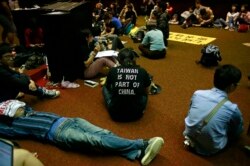The majority of Taiwanese citizens reject mainland China and hold positive views of the United States, a U.S. poll indicates.
The survey, conducted by the Pew Research Center in October-November 2019 prior to Taiwan's general elections, shows that the Taiwanese favor strengthening economic and political ties with the United States over China by a ratio of 2-to-1.
The poll also shows many Taiwanese don't think of themselves as Chinese.
Sixty-six percent of respondents view themselves as Taiwanese, 28% as both Taiwanese and Chinese, and 4% as only Chinese.
But despite rejecting political ties with mainland China, many Taiwanese are willing to consider reinstating economic relations with Beijing.
Fifty-seven percent of those who call themselves both Chinese and Taiwanese hold positive views of mainland China, compared with 23% of people who say they are Taiwanese.
Those who self-identify as solely Taiwanese are more likely to express interest in closer relations with the U.S. than those who identify as both Taiwanese and Chinese.
According to the Pew survey, young adults are more likely to favor increased U.S.-Taiwan relations, with 73% of 18-to-29-year-olds having favorable views of the U.S., and 82% of the same population wanting to see more political cooperation between Taipei and Washington. Among those 50 and older, 55% say they agree with increased relations with mainland China.
Those who identify as Taiwanese-Chinese tend to favor normalizing relations with China, in addition to holding largely positive views of mainland China, the poll found.
The survey found members of the KMT party are four times as likely to align with pro-China stances than members of the ruling DPP party, which espouses independence. The survey also revealed that the majority of adults who do not closely affiliate with either party do not possess positive views of mainland China.
Even though the U.S. diplomatically recognizes mainland China, the U.S. has maintained informal ties with Taiwan.
The telephone survey of 1,562 people, conducted last fall, has a margin of error of plus or minus 3.2 percentage points.






